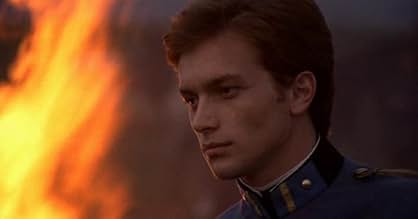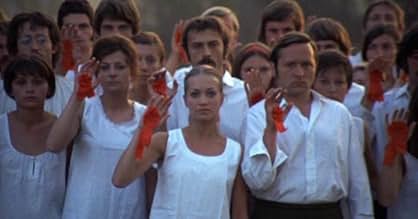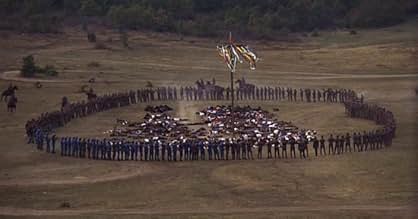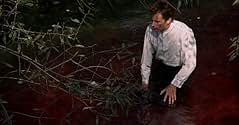NOTE IMDb
6,7/10
2,1 k
MA NOTE
Ajouter une intrigue dans votre langueSet in the 1890s on the Hungarian plains, a group of farm workers go on strike in-which they face harsh reprisals and the reality of revolt, oppression, morality and violence.Set in the 1890s on the Hungarian plains, a group of farm workers go on strike in-which they face harsh reprisals and the reality of revolt, oppression, morality and violence.Set in the 1890s on the Hungarian plains, a group of farm workers go on strike in-which they face harsh reprisals and the reality of revolt, oppression, morality and violence.
- Réalisation
- Scénario
- Casting principal
- Récompenses
- 1 victoire et 2 nominations au total
Avis à la une
9thao
Here is something you have never seen before. A war musical with dancing naked women, armed men, choreographed walking, communist folk songs and poetic settings.
The film is based on peasant uprisings in Hungary that occurred between 1980 and 1910. The style is like something from a poetic theater. People hardly talk and everything is very staged. You might even say fake. Well, I suspect the message of the film is in the style. It is fake because communism and its origin was fake. It was an Utopia based on a lie. Miklós Jancsó was a socialist but not a communist (most people confuse the two) and he was critical of the direction his country was taking (as can be seen in other films by him). Here he gets the communist government to finance a film that looks like a glorious praise of the origin of the party while the style is telling us that this is all a staged lie. Don't believe it, any more than you believe that all these scenes are a realistic account of what happened.
The music is brilliant. Folk songs, many probably used in the peasant uprisings. I also liked the staging and the poetic imagery, like how a stigmata wound in the hand turned into a red flower, which looks like a French Revolution rosette cockade pin. And how many will die only because of one shot fired. And the use of doves, as symbols of peace and harmony, was beautiful. And the naked women? I guess they represent the innocence and the beauty of the peasant, who in their ignorance believed in the promised land.
You might not enjoy this film if you watch it as a straight communist propaganda. Watch it as a clever Trojan horse, pretending to be one thing while smuggling critical social commentary and you might get much more out of it. I for one liked this film for its bravery, its message, poetic beauty and for being like no other musical out there.
The film is based on peasant uprisings in Hungary that occurred between 1980 and 1910. The style is like something from a poetic theater. People hardly talk and everything is very staged. You might even say fake. Well, I suspect the message of the film is in the style. It is fake because communism and its origin was fake. It was an Utopia based on a lie. Miklós Jancsó was a socialist but not a communist (most people confuse the two) and he was critical of the direction his country was taking (as can be seen in other films by him). Here he gets the communist government to finance a film that looks like a glorious praise of the origin of the party while the style is telling us that this is all a staged lie. Don't believe it, any more than you believe that all these scenes are a realistic account of what happened.
The music is brilliant. Folk songs, many probably used in the peasant uprisings. I also liked the staging and the poetic imagery, like how a stigmata wound in the hand turned into a red flower, which looks like a French Revolution rosette cockade pin. And how many will die only because of one shot fired. And the use of doves, as symbols of peace and harmony, was beautiful. And the naked women? I guess they represent the innocence and the beauty of the peasant, who in their ignorance believed in the promised land.
You might not enjoy this film if you watch it as a straight communist propaganda. Watch it as a clever Trojan horse, pretending to be one thing while smuggling critical social commentary and you might get much more out of it. I for one liked this film for its bravery, its message, poetic beauty and for being like no other musical out there.
I consider the discussion about art to be a meaningless waste of energy, so I will let others sort out whether this is 'great art' or not. Whether or not this is a cinematic triumph against plot and character though, as championed by many, will invariably depend on your definition of cinematic. It does not meet mine, at least my definition of richly cinematic worth leaving the mind behind.
Here's the setup: it is apparently the 1890's, the place is a stretch of Hungarian plains rolling in the distance. A village of farmers has gone into a strike, with a battle being fought over their soul and minds. Now and then newcomers emerge from nowhere, young intellectuals who give spirited lectures on Engels and socialist theory, priests with their sermons and rites, soldiers of some distant , oppressive authority.
The people are by turns confused and spirited, bold and despairing. They lash out against each other, burn a church. They pray and hold court. Now and then they sing and dance about their woes, stabbing who they see as more privileged. Soldiers swell their revolutionary ranks, then break out and shoot them. It all happens in circles in that same featureless plain.
The allegory is stark, what the Czech had been for years leveling against Nazis: covert attack on the hypocrisy and tyranny of a distant state, by celebrating betrayed hopes and idealism.
That's all fine, but for one factor.
We see a lot of upheaval, a lot of pain turned into song. But we are not tethered into human soul for any of it. We never know any of these people except schematically, as actors on a stage. A disembodied camera liturgically roams and roams around these faces, but we have no entry into the soft underbelly of actual lives.
It is a matter of presentation. In The Red and the White, Jancso solved this by first ushering us into a world at war, with stakes and limits, with blood coursing through people. So when he abstracted, we were moved the right distance away from the aimless bloodspill to view a more cosmic grind.
Here the abstraction is all done before we get there. The abstract world is already in place and does not transform again; the sparse setting, the visitations, recitations and ceremonies. You don't make the jump to an ecstatic view, and it has to be you.
So the effect is like being taken to a room where people are calmly sitting with eyes closed and told this solemn air that you see is meditation. How do you know they're not sleeping?
Here's the setup: it is apparently the 1890's, the place is a stretch of Hungarian plains rolling in the distance. A village of farmers has gone into a strike, with a battle being fought over their soul and minds. Now and then newcomers emerge from nowhere, young intellectuals who give spirited lectures on Engels and socialist theory, priests with their sermons and rites, soldiers of some distant , oppressive authority.
The people are by turns confused and spirited, bold and despairing. They lash out against each other, burn a church. They pray and hold court. Now and then they sing and dance about their woes, stabbing who they see as more privileged. Soldiers swell their revolutionary ranks, then break out and shoot them. It all happens in circles in that same featureless plain.
The allegory is stark, what the Czech had been for years leveling against Nazis: covert attack on the hypocrisy and tyranny of a distant state, by celebrating betrayed hopes and idealism.
That's all fine, but for one factor.
We see a lot of upheaval, a lot of pain turned into song. But we are not tethered into human soul for any of it. We never know any of these people except schematically, as actors on a stage. A disembodied camera liturgically roams and roams around these faces, but we have no entry into the soft underbelly of actual lives.
It is a matter of presentation. In The Red and the White, Jancso solved this by first ushering us into a world at war, with stakes and limits, with blood coursing through people. So when he abstracted, we were moved the right distance away from the aimless bloodspill to view a more cosmic grind.
Here the abstraction is all done before we get there. The abstract world is already in place and does not transform again; the sparse setting, the visitations, recitations and ceremonies. You don't make the jump to an ecstatic view, and it has to be you.
So the effect is like being taken to a room where people are calmly sitting with eyes closed and told this solemn air that you see is meditation. How do you know they're not sleeping?
Jancso's movies can be recommended only to people with serious interest in movie-making and especially alternative European cinema. As in "Szerelmem, Elektra" Jancso again uses his favorite images and sounds. Hundreds of extras dance and perform rituals on the vast Hungarian plain surrounded by galloping horses (a traditional Hungarian animal as the Hungarians are heirs of the nomadic Huns). Very often the viewer is confronted by naked women walking around, I am still confused as to what they symbolize...that socialism needs no violence to overtake the old regime? Another typical feature is the solemnity with which the actors converse and act, no real dialog is to be found but a series of monologues. These monologues reveal what Jancso is most interested in - socialism and the equality of people. It is difficult for the viewer to keep up with them as they follow one after the other to bombard him with socialist ideology on the rights of the workers, the rising of the masses, the resistance, etc. Jancso tries to show that socialism can peacefully convert even the officials of the old order as seen by the officer refusing to suppress the mutineers and the soldiers dancing with the crowd towards the end of the movie. Regarding the lengthy monologues on socialism, a resemblance to Godard and his La Chinoise...?
This movie is difficult to watch due to its complex imagery intertwined with the socialist ideology that Jancso's characters devour us with. There may appear the question whether this movie can be seen out of the context of a life in a regime glorifying socialism (Hungary between 1945 and 1989). For anyone interested in movie-making by Hungarian directors, I recommend first starting with Szabo's films such as Mephisto, Oberst Redl and Sunshine, then going through Bela Tarr's movies, and finally trying Jancso.
This movie is difficult to watch due to its complex imagery intertwined with the socialist ideology that Jancso's characters devour us with. There may appear the question whether this movie can be seen out of the context of a life in a regime glorifying socialism (Hungary between 1945 and 1989). For anyone interested in movie-making by Hungarian directors, I recommend first starting with Szabo's films such as Mephisto, Oberst Redl and Sunshine, then going through Bela Tarr's movies, and finally trying Jancso.
Note: This review was written in 2004.
Jancso's famous poetic film that was so much debated in our overly-politicized youth when it first appeared. A work flooded with music and singing, a continuous choreography-hymn to the revolution that wins the viewer overcoming rational resistance. Of course, the film is viewed very differently now in the years of a single world superpower than thirty years ago in the years of fermentation and hope. There is now a widespread disappointment about the film's issues, a skepticism about what it claims, and its optimistic finale is rather received with a sigh ...
The issue of the rebellion of oppressed peasants seems to belong to a very distant past, and the historical victory of the "people," where it happened anyway, did not evolve as its prophets dreamed of. It is also remarkable that the film seems to support a non-Soviet version of the revolution, where, as its leader states, "the land belongs only to those who cultivate it", meaning of course that it does not belong to the landowners - neither to the State, we conclude!
Also noteworthy are the religious connotations that (inevitably?) the revolutionaries give to their actions: after resisting the priests, as collaborators of Power, and after burning a church in a choreographic way, they set their own ritual: a People's "Sunday Prayer" a "confession and repentance" of the deceived villager who collaborated with the authorities and returns to the "People", a pagan funeral, etc. Obviously, at the time of the film (1972), all of these were part of the communist practice that tried to uproot the faith of the simple people, but also needed to devise ritualistic substitutes. Today, they are viewed as just another failed anti-Christian effort of a rigid ideological system.
Overall, Jancso's film is an enviable achievement of poetic cinema, where human characters are absent, since every person appearing is nothing more than a "bearer of ideology and history". With the continuous movement of the camera, the complete absence of interior scenes (the entire, absolutely entire, movie is filmed outdoors, in the endless Hungarian plain), music and dance, it captivates the viewer, apparently showing the way to directors who followed, like Bertolucci and Angelopoulos. Unfortunately the passing of time left its mark on the film copy and all its wonderful colors have degraded to a monochrome brownish. A film certainly worth the 1972 Cannes Film Prize.
Overall, Jancso's film is an enviable achievement of poetic cinema, where human characters are absent, since every person appearing is nothing more than a "bearer of ideology and history". With the continuous movement of the camera, the complete absence of interior scenes (the entire, absolutely entire, movie is filmed outdoors, in the endless Hungarian plain), music and dance, it captivates the viewer, apparently showing the way to directors who followed, like Bertolucci and Angelopoulos. Unfortunately the passing of time left its mark on the film copy and all its wonderful colors have degraded to a monochrome brownish. A film certainly worth the 1972 Cannes Film Prize.
The Red Psalm is an almost unapproachable film these days; the filmmaking practises of today have made us western viewers forget how to watch films that are not made to entertain.
The Story is simple enough: the Red Psalm depicts the rise and fall of a peasant revolt in the earliest days of socialism. The focus is on the reasons why it doesn't succeed, rather than on characters and plot. In fact, to use words like "character" and "plot" in connection to the Red Psalm would be misguiding.
This is an example of a film where message dictates the cinematic language of the film. It is not meant to be a realistic depiction of the living conditions of the peasants in the late 19th century. Instead it tries to depict realistically the reasons and causes of such tragedies in general. The film is full of what some people would call "gaffes", but they are there just because it does not matter if the actor has his wristwatch on or whether the guitar has nylon strings. That kind of authenticity is only superficial.
All in all, The Red Psalm is an ultimately challenging viewing recommended for everyone who is looking for alternatives to Hollywood pap. It demands the attention of the viewer throughout, because it is not generic in any way. Yet it is not without its flaws. It is extremely slow paced, full of folk dancing and saturated with socialist propaganda. Yet features like Jancso's free flowing camera should interest at least wannabe filmmakers to this challenging and complex film.
The Story is simple enough: the Red Psalm depicts the rise and fall of a peasant revolt in the earliest days of socialism. The focus is on the reasons why it doesn't succeed, rather than on characters and plot. In fact, to use words like "character" and "plot" in connection to the Red Psalm would be misguiding.
This is an example of a film where message dictates the cinematic language of the film. It is not meant to be a realistic depiction of the living conditions of the peasants in the late 19th century. Instead it tries to depict realistically the reasons and causes of such tragedies in general. The film is full of what some people would call "gaffes", but they are there just because it does not matter if the actor has his wristwatch on or whether the guitar has nylon strings. That kind of authenticity is only superficial.
All in all, The Red Psalm is an ultimately challenging viewing recommended for everyone who is looking for alternatives to Hollywood pap. It demands the attention of the viewer throughout, because it is not generic in any way. Yet it is not without its flaws. It is extremely slow paced, full of folk dancing and saturated with socialist propaganda. Yet features like Jancso's free flowing camera should interest at least wannabe filmmakers to this challenging and complex film.
Le saviez-vous
- AnecdotesIncluded among the "1001 Movies You Must See Before You Die", edited by Steven Schneider.
Meilleurs choix
Connectez-vous pour évaluer et suivre la liste de favoris afin de recevoir des recommandations personnalisées
- How long is Red Psalm?Alimenté par Alexa
Détails
- Durée1 heure 27 minutes
- Mixage
- Rapport de forme
- 1.37 : 1
Contribuer à cette page
Suggérer une modification ou ajouter du contenu manquant





















